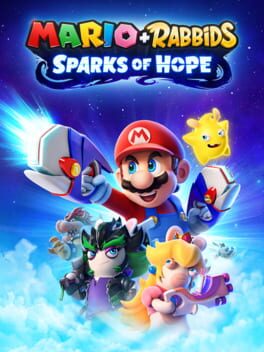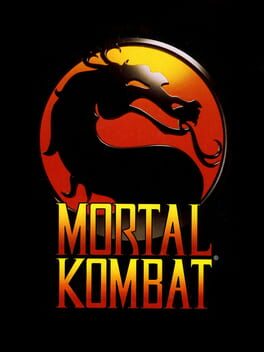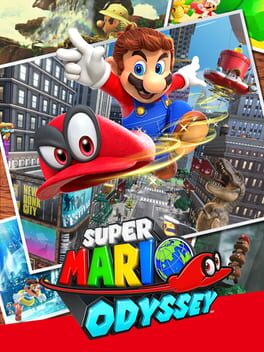JedPressgrove
Bio
From Mississippi, living in California. Game critic since 2013. Created award-winning blog Game Bias. Published in Slant, Paste, Unwinnable, and the Monkey Island Chronicles book from Limited Run games.
From Mississippi, living in California. Game critic since 2013. Created award-winning blog Game Bias. Published in Slant, Paste, Unwinnable, and the Monkey Island Chronicles book from Limited Run games.
Badges

1 Years of Service
Being part of the Backloggd community for 1 year

Pinged
Mentioned by another user

Loved
Gained 100+ total review likes

Trend Setter
Gained 50+ followers

Well Written
Gained 10+ likes on a single review

Gone Gold
Received 5+ likes on a review while featured on the front page

Liked
Gained 10+ total review likes

Popular
Gained 15+ followers

Best Friends
Become mutual friends with at least 3 others

Noticed
Gained 3+ followers
002
Total Games Played
000
Played in 2024
000
Games Backloggd
Recently Reviewed See More
The thrill is gone. Mario + Rabbids Kingdom Battle brought demented genius to tactics by reimagining the possibilities of tile-based movement, simplifying hit accuracy (making battles more dangerous than expected), and flipping the morbid tone of XCOM on its head. This sequel drains Mario + Rabbids of its irony. Sparks of Hope offers more characters, fights, powers, and overworld exploration, but all these extras create a more plodding experience with predictable outcomes.
Sparks of Hope is adequate. Exploiting the unique advantages of Mario, Rabbid Mario, newcomer Slash, and the rest of the cast remains an engaging, albeit easier, proposition. It's better if you find your back against a wall, as when one scenario whittled my party down to Luigi, which forced me to carefully snipe at three enemies for numerous turns until I was the last thing standing.
But such moments are unlikely due to the addition of Sparks. Sparks resemble the Summons creatures from the Final Fantasy series, only they make combat much more lopsided in your favor, even if you crank up the difficulty setting. In addition to giving your party members passive stat bonuses, Sparks can be called upon during battle and enhance your already formidable list of abilities. Absurdly, each character can equip two Sparks. Unless you're new to turn-based tactics, there's no reason why you shouldn't dominate the competition with this overwhelming amount of game-breaking possibilities.
It doesn't help that Sparks of Hope lacks enemy variety despite ratcheting up the number of encounters to a gluttonous degree. The level-gaining potential is so high that you'll rarely be unprepared or caught off-guard.
The biggest disappointment in Sparks of Hope lies in its bullshit promise of increased spatial freedom. The game claims to take away the tiles that characterize tactical games, but the tiles are merely invisible now. Why pretend that limited spacing for character positioning doesn't exist? It's one of the most idiotic gameplay features ever conceived.
Similarly, the introduction of real-time factors, like ticking bombs and wind gusts, don't actually translate Sparks of Hope into a more dynamic game. Ubisoft could have gone wild with this concept. Foes waiting their turn could have unpredictably come alive for all-out brawls. Party members could have been synchronized for innovative combos. Environmental factors could have transformed areas into meat-grinding lessons of attrition and resilience. Instead, everything can be measured and foreseen. Sparks of Hope is just another proponent of ego-stroking modern design, where players sleepwalk through their uneventful gaming lives.
Sparks of Hope is adequate. Exploiting the unique advantages of Mario, Rabbid Mario, newcomer Slash, and the rest of the cast remains an engaging, albeit easier, proposition. It's better if you find your back against a wall, as when one scenario whittled my party down to Luigi, which forced me to carefully snipe at three enemies for numerous turns until I was the last thing standing.
But such moments are unlikely due to the addition of Sparks. Sparks resemble the Summons creatures from the Final Fantasy series, only they make combat much more lopsided in your favor, even if you crank up the difficulty setting. In addition to giving your party members passive stat bonuses, Sparks can be called upon during battle and enhance your already formidable list of abilities. Absurdly, each character can equip two Sparks. Unless you're new to turn-based tactics, there's no reason why you shouldn't dominate the competition with this overwhelming amount of game-breaking possibilities.
It doesn't help that Sparks of Hope lacks enemy variety despite ratcheting up the number of encounters to a gluttonous degree. The level-gaining potential is so high that you'll rarely be unprepared or caught off-guard.
The biggest disappointment in Sparks of Hope lies in its bullshit promise of increased spatial freedom. The game claims to take away the tiles that characterize tactical games, but the tiles are merely invisible now. Why pretend that limited spacing for character positioning doesn't exist? It's one of the most idiotic gameplay features ever conceived.
Similarly, the introduction of real-time factors, like ticking bombs and wind gusts, don't actually translate Sparks of Hope into a more dynamic game. Ubisoft could have gone wild with this concept. Foes waiting their turn could have unpredictably come alive for all-out brawls. Party members could have been synchronized for innovative combos. Environmental factors could have transformed areas into meat-grinding lessons of attrition and resilience. Instead, everything can be measured and foreseen. Sparks of Hope is just another proponent of ego-stroking modern design, where players sleepwalk through their uneventful gaming lives.
Mortal Kombat inflicted more collective brain damage to gamers than any other release. Thirty years later, many people still believe fatalities are cool rather than repetitive novelties.
This game has an embarrassing lack of depth. Fighting game characters should be distinguished by more than appearances and a couple of special moves. The basic techniques (rapid jabs, sweeps, etc.) all look and feel the same from combatant to combatant. There's a reason for the laziness: MK banks on blood to enrapture its audience. (What an absolute joke it was back in the 1990s seeing critics pretend this crap rivaled Street Fighter II.)
The fatalities themselves are not even that interesting in hindsight. That's because MK functions like pornography. Pornographic thrills in media grow more explicit to satisfy people's unending lust. The fatalities of today are much more gruesome and intricate. Even if they repulse someone, they grab more attention. The original finishers have thus become irrelevant to all but the most nostalgic of fans. With MK, you can't get no satisfaction because it's all about temporary highs, as opposed to timeless gameplay.
Resist the urge to pat MK on the back for being the most playable of the old fighters with digitized graphics. Transcending the likes of Pit Fighter and Way of the Warrior is like being able to back your car out of a parking spot with no accident, as opposed to ramming the vehicle into a stationary object. MK is the bare minimum for people who don't care about craft in video games.
This game has an embarrassing lack of depth. Fighting game characters should be distinguished by more than appearances and a couple of special moves. The basic techniques (rapid jabs, sweeps, etc.) all look and feel the same from combatant to combatant. There's a reason for the laziness: MK banks on blood to enrapture its audience. (What an absolute joke it was back in the 1990s seeing critics pretend this crap rivaled Street Fighter II.)
The fatalities themselves are not even that interesting in hindsight. That's because MK functions like pornography. Pornographic thrills in media grow more explicit to satisfy people's unending lust. The fatalities of today are much more gruesome and intricate. Even if they repulse someone, they grab more attention. The original finishers have thus become irrelevant to all but the most nostalgic of fans. With MK, you can't get no satisfaction because it's all about temporary highs, as opposed to timeless gameplay.
Resist the urge to pat MK on the back for being the most playable of the old fighters with digitized graphics. Transcending the likes of Pit Fighter and Way of the Warrior is like being able to back your car out of a parking spot with no accident, as opposed to ramming the vehicle into a stationary object. MK is the bare minimum for people who don't care about craft in video games.
The 3D Mario titles have a similar illness. They demand the collection of celestial bodies, many of which appear in obvious places or require the player to engage in gameplay gimmicks. And their tone is largely one-dimensional, to the point where the games' joyfulness devolves into smarminess. This is why I don't bow before the innovative Super Mario 64, and why when I revisited Super Mario Galaxy last year, I came away thinking, "How did I ever believe this was all-time great?" (Note: I haven't played Super Mario Sunshine, so perhaps its unusual qualities would impress me.)
Super Mario Odyssey has its fair share of stupidly hidden moons and disposable appeals to nostalgia (e.g., when fully rendered Mario transforms into super pixelated Mario). But there is a wickedness to Odyssey that makes the game more intriguing than its overwhelmingly friendly ancestors.
Cappy, a talking hat, is the most subversive figure of any mainline Mario game (I have to exclude the Mario RPGs because they always mock conventions). He represents corporate branding to the extreme: When Mario hits certain enemies or objects with Cappy, it allows him to possess things like a demon — and mark them with his patented cap and mustache. In previous Mario games, the hero gains powers by acquiring items or suits. Here, he takes away the will and agency of others, manipulating their existence. This dynamic can have disturbing connotations when it involves living creatures, but it makes Super Mario Odyssey a strangely honest game about how three-dimensional space — and everything in it — is here for our exploitation. The weird implications of using Cappy overshadow a lot of that overbearing optimistic tone that grates on my nerves. Cappy outs Nintendo's dark edges. (Fellow critic Andrew Hathaway once compared Odyssey's demented vibes to the trick in Super Mario World where Mario can sacrifice Yoshi in midair to continue platforming.)
Half the fun in Odyssey is finding out what Mario can possess. Some options resemble bizarre gags or asides, like the piece of meat or the man with the remote-controlled car, but actually lead to moons. The most substantial forms enable distinct attacks and modes of travel. While many of the possibilities involve classic Mario foes like Chain Chomps and Bullet Bills, I was drawn more to the unique additions like Spark Pylons and Pokios, the latter of which allow for some of the most compelling platforming in 3D Mario history.
Odyssey has too many limitations and too much bloat to compete with the greatest Mario games (Super Mario Bros., Mario 3, Yoshi's Island). But with Cappy's devilish capabilities and a strange assortment of locations like Metro Kingdom, Luncheon Kingdom, and Lost Kingdom, Odyssey is the most gonzo of all Mario platformers. Indeed, where can the Italian plumber go from here? The other 3D Marios didn't stoke my imagination like this. They merely granted a fleeting sort of happiness.
Super Mario Odyssey has its fair share of stupidly hidden moons and disposable appeals to nostalgia (e.g., when fully rendered Mario transforms into super pixelated Mario). But there is a wickedness to Odyssey that makes the game more intriguing than its overwhelmingly friendly ancestors.
Cappy, a talking hat, is the most subversive figure of any mainline Mario game (I have to exclude the Mario RPGs because they always mock conventions). He represents corporate branding to the extreme: When Mario hits certain enemies or objects with Cappy, it allows him to possess things like a demon — and mark them with his patented cap and mustache. In previous Mario games, the hero gains powers by acquiring items or suits. Here, he takes away the will and agency of others, manipulating their existence. This dynamic can have disturbing connotations when it involves living creatures, but it makes Super Mario Odyssey a strangely honest game about how three-dimensional space — and everything in it — is here for our exploitation. The weird implications of using Cappy overshadow a lot of that overbearing optimistic tone that grates on my nerves. Cappy outs Nintendo's dark edges. (Fellow critic Andrew Hathaway once compared Odyssey's demented vibes to the trick in Super Mario World where Mario can sacrifice Yoshi in midair to continue platforming.)
Half the fun in Odyssey is finding out what Mario can possess. Some options resemble bizarre gags or asides, like the piece of meat or the man with the remote-controlled car, but actually lead to moons. The most substantial forms enable distinct attacks and modes of travel. While many of the possibilities involve classic Mario foes like Chain Chomps and Bullet Bills, I was drawn more to the unique additions like Spark Pylons and Pokios, the latter of which allow for some of the most compelling platforming in 3D Mario history.
Odyssey has too many limitations and too much bloat to compete with the greatest Mario games (Super Mario Bros., Mario 3, Yoshi's Island). But with Cappy's devilish capabilities and a strange assortment of locations like Metro Kingdom, Luncheon Kingdom, and Lost Kingdom, Odyssey is the most gonzo of all Mario platformers. Indeed, where can the Italian plumber go from here? The other 3D Marios didn't stoke my imagination like this. They merely granted a fleeting sort of happiness.


